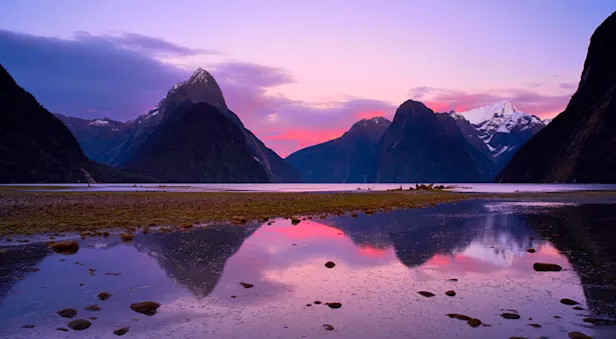What to Pack for Your New Zealand Adventure
The following packing list contains general recommendations for a New Zealand nature adventure. If you are currently booked on a New Zealand adventure with Nat Hab, please consult your pre-departure materials for the most up-to-date packing list specific to your trip. You will receive these pre-departure materials 60-90 days before your departure.
Items indicated in color below are typically available in the Nat Hab Gear Store. Please note that due to global supply chain issues beyond our control, we cannot guarantee that every item will always be in stock.
Adventure Guidelines
New Zealand is a land of tremendous physical and climatic diversity; therefore, layering is the best approach to staying warm and dry. During this adventure, you will need to be prepared for cold, wet weather. Waterproof rain gear is ESSENTIAL, as there is always the possibility that we may experience downpours during our adventure. We also recommend a fleece jacket, hat and gloves. The weather can be variable when we explore the South Island.
The sun in New Zealand is particularly damaging due to the reduced ozone; thus, good sunscreen, lightweight, long-sleeved shirts and a hat are essential for your protection.
Weather can vary greatly in New Zealand. October is spring and can be quite cold, December and January and February are the height of summer and March is fall so it can be chilly.
Clothing
Lightweight neck gaiter (included in your pre-departure package)
—Provides sun, wind and/or dust protection.Lightweight, breathable waterproof rain jacket and rain pants
—Waterproof, not just water resistant. Your rain jacket should have a hood. These may be your most useful pieces of clothing, as you will be walking in areas where it could drizzle all day or, at times, rain down in buckets!Sturdy lightweight hiking shoes
—Weather can change quickly in NZ and it is never a bad idea to have waterproof shoes on.2 fleece pullovers or sweaters
1–2 pairs of shorts
—For January-April departures. Shorts may not be necessary in November and December.2–4 pairs of pants
1 pair of nylon zip-off pants
—These are great for hiking as they are great for cool mornings and warmer afternoons.Several pairs of lightweight hiking socks
—Moisture-resistant/moisture-wicking socks are preferred. Cotton socks are not recommended for hikes.Lightweight sleepwear
Warm hat and gloves (for cold weather)
1 nice outfit
—Optional—for extra time spent in Christchurch or Dunedin.
Additional Items
Cash
—For discretionary gratuities (you may want to bring envelopes for discreet presentation).
—For personal spending (souvenirs, Internet use, or food and beverages not included in your trip fee).Binoculars
—Binoculars are essential for this adventure! A quality pair with a magnification of 8 x 30 or 10 x 40 will definitely enhance your wildlife-viewing experience, and you will get the most out of them if you practice using them at home and make a habit of having them with you regularly on the adventure. We strongly suggest that each client bring his or her own pair of binoculars, as you will be using them continuously.
Water-resistant daypack (to carry cameras and other gear during outings)
Sun hat with brim (and strap so it won’t blow away)
Reusable water bottle (included in your pre-trip package)
—In our continuing effort to operate our adventures with as little impact on the environment as possible, you will receive a reusable water bottle (unless you opted out on your Booking Form) to take with you on your adventure. We will provide drinking water throughout the adventure for you to refill your bottle. By doing this, you will avoid using multiple disposable plastic bottles.Electrolyte/flavor crystal packets (optional)
—Can be added to water to replace fluids in case of intestinal illness and/or enhance the taste to encourage hydration.Outlet adapter and/or power converter
Headlamp with spare batteries (optional)
—While flashlights/headlamps are not permitted during the kiwi-spotting excursion, there are other optional night walks where a flashlight/headlamp will come in handy. Headlamps are useful, as they will leave your hands free to help you navigate.Sunglasses (with UV filter and secure strap)
Hairdryer (optional)
—Hairdryers are available at all accommodations, either in the room or at reception.Toiletries in reusable bottles to minimize waste
—Shampoo, conditioner and soap are provided at most of our accommodations, with the exception of Bay Motel and Southern Seas Hotel which provides only shampoo and soap.
Sunscreen & lip balm (at least SPF30)
Prescription medications & favorite remedies
—For headaches, colds, upset stomach, etc.
—If you are prone to motion sickness, you will want to bring your preferred motion sickness medication.Insect repellent & anti-itch ointment
—Although biting insects are generally not a problem in New Zealand, it is a good idea to bring bug repellent. Sand flies on the West Coast have a reputation for causing discomfort. We avoid these bugs where possible; however, we may encounter them occasionally.
—Insect Repellent will be available on the bus, but you may want to bring your own if you prefer a specific brand.
—Repellents containing DEET are the most effective against mosquitoes, but please be aware that DEET is a very strong ingredient that can damage plastics, clothing and equipment.Prescription glasses/contact lenses
Reusable waterproof bags
—Several sizes for wet or dirty clothing and to protect camera equipment.Hiking poles (optional)
—A limited supply of hiking poles may be available for use during the adventure.
—If you are bringing hiking poles, they must be able to fit in your check-in luggage, as you won't be allowed to carry them on the plane.
Browse Our Trips to Asia & The Pacific

The Wild Side of China: A Nature Odyssey
Discover a side of China most travelers never see on our unique itinerary revealing wild panda habitat, rare wildlife and Chinese nature at its most entrancing—including close-up panda encounters.

























